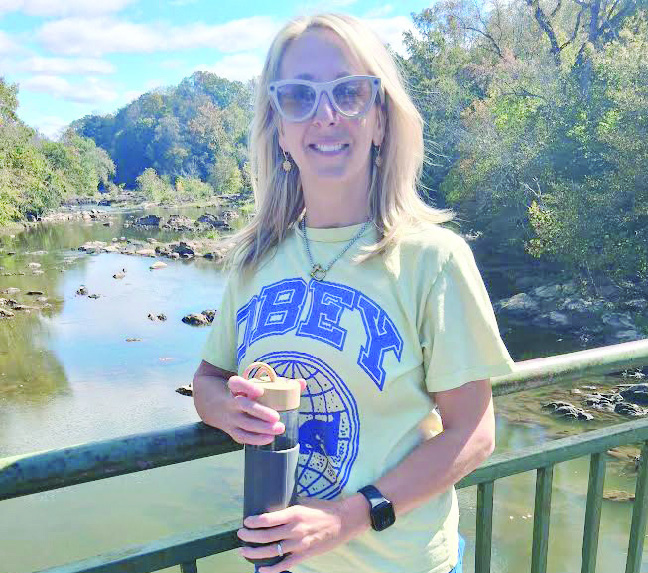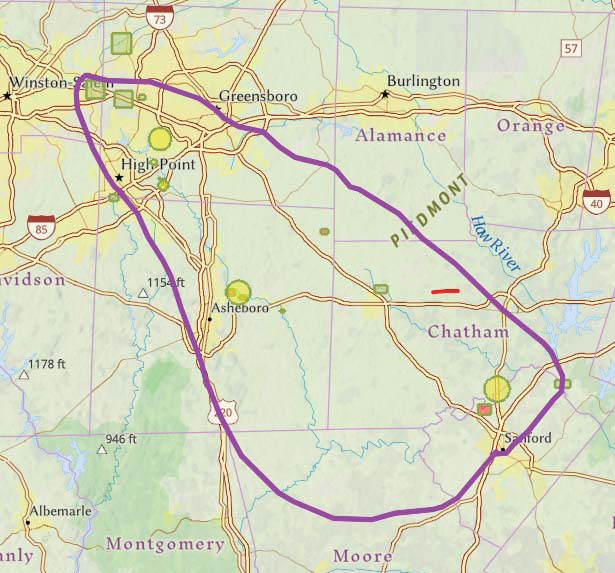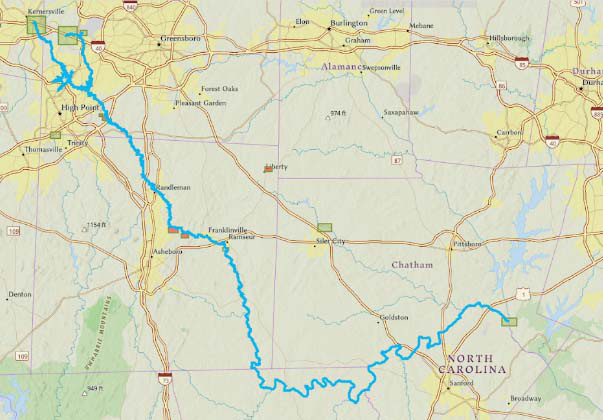Welcome!

Stephanie Stephens stands on the Franklinville footbridge, which overlooks ‘her’ river, the Deep. (Photo: Larry Penkava / Randolph Hub)
Deep River's new riverkeeper wants to make you care about the river
FRANKLINVILLE — “We’ve got to get people to care about the river. When they’re connected, they care.”
Those are the words of Deep River’s new riverkeeper, Stephanie Stephens. She met at the footbridge that spans Deep River at Riverside Park in Franklinville to talk about her new role and how it came about.
Stephens earned her undergraduate and master’s degrees in Environment and Sustainability at UNC-Greensboro. It was during her research for her master’s degree that she “wanted to advocate for a riverkeeper for Deep River because that’s where I got my water.”
Her studies of Deep River showed “a clear need for a riverkeeper to protect the river,” she said.
Stephens did an internship with the Yadkin River riverkeeper, Edgar Miller, who “showed me the ropes and what the organization does.” Then, after receiving her master’s degree in the fall of 2023, she was hired by Yadkin as a water quality specialist.
Meanwhile, Dr. Patricia Gray of UNCG, one of Stephens’ advisers, was recruiting board members for the fledgling Deep River Riverkeeper, or DRRK. “Then she asked me in August (2024) to be the riverkeeper.”
But there’s a lengthy process involved to receive a license, which included getting the support of neighboring riverkeepers, incorporating as a nonprofit and writing a licensing proposal.
The DRRK was approved by the Waterkeeper Alliance on June 11 but Stephens had already been doing some of the duties of a riverkeeper.
First, she had to draw a map of her Deep River jurisdiction. “It was like creating my kingdom,” Stephens said. That includes the entire 125-mile length of Deep River and all its tributaries, including Rocky River in Chatham County.
The headwaters are formed by the West Fork of the Deep River that originates near US 421 in Kernersville in Forsyth County, and the East Fork that’s traced to Sandy Ridge Road off I-40 west of the Piedmont Triad International Airport in Guilford County. The West Fork runs into Oak Hollow Lake and the East Fork flows to City Lake, both in High Point, before joining each other.
Then it moves into Randolph County, where the 3,000-acre Randleman Reservoir impounds much of the river’s water for treatment and use by the Piedmont Triad Regional Water Authority (PTRWA).
Most of Deep River’s 125 miles are through Randolph County, where seven mill towns were formed along its banks to take advantage of its water power. The river then snakes through Moore and Chatham counties before joining with the Haw River in Lee County to form the Cape Fear River, the longest river in North Carolina.
The Deep River is a long waterway for a riverkeeper, especially since much of the river is in urban areas with the pollutants that come with them.
“There’s a lot to do but it’s exciting,” Stephens said. “I’m looking to build a strong membership on Facebook. We already have more than 9,000 followers.”

On the orga
nization’s website, www. deepriverkeepersnc.org, is found the mission: “To protect the Deep River and its Neighbors through science, education and stewardship.
“We do this through projects and programs that include public participation. We advocate for and work to ensure the Deep River’s well-being as a vital, healthy, life sustaining source for all.”
One major contribution by DRRK is providing a Swim Guide from Memorial Day to Labor Day. “We sample for E.coli at major recreation sites and share the data online, either pass or fail,” Stephens said.
DRRK has also allied with PTRWA to clean up the shoreline around the Randleman Reservoir, a challenging task considering the amount of trash that flows down from upstream.
Then there’s the Seaboard Chemicals federal superfund cleanup which goes back decades. Despite efforts to remove hazardous materials, Stephens said tests are “finding high levels of 1,4 dioxane and PFAS (known as ‘forever chemicals’). The levels are spiking. Why? We need answers and people want to know. It impacts the reservoir.”

One bit of good news, she said, is that the PTRWA is employing the use of reverse osmosis equipment to filter out unwanted substances. “They’re treating with the best filtration in the world but that will raise (water) rates.
“We want to get behind retrofitting water treatment plants and wastewater treatment plants with new equipment to remove chemicals,” Stephens said. “Rates will go up but it will protect us. As more is done, rates will go down.”
And more responsibility should be taken by the sources of unwanted chemicals, Stephens said. “We do not want harmful chemicals discharged in Deep River. The source should treat chemicals before sending them to the wastewater treatment plant.
“We are in a new era of synthetic chemicals, be it pharmaceutical drugs, unregulated emerging contaminants and microplastics that we need to be worried about in our surface and drinking water. We need to upgrade facilities which are designed to treat human waste.”
Stephens said people are depending on bottled water to avoid what they think is unsafe tap water. “Bottled water is perceived as better but it’s tap water,” she said.
DRRK is working with other groups, such as Keep Randolph Beautiful (Stephens is now a board member), to build strong relationships in becoming innovative in how to treat water, and how to move from the old ways to manage the water quality of the river.
Another initiative is the use of hydrophones to record the sounds of species both terrestrial and in the water where dams are being removed, including in Ramseur. Those sounds, when collected, will be sent to the University of Copenhagen, where they’ll be interpreted to see if dam removal improves the natural habitat. Of particular interest along Deep River are certain species of mussels, bats and birds.
The Deep River Riverkeeper is collaborating with the Haw River Assembly and the Cape Fear River Watch to protect the waters of these streams. Members of DRRK, including Stephens, Gray and Steve Drew, who formerly was Greensboro’s director of water resources, will give talks on Deep River and its challenges.
For more information, contact Stephens at 336-500-7277 or stephanie@ deepriverkeepersnc.org, visit www.deepriverkeepersnc.org or look up Deep River Riverkeepers on Facebook.
